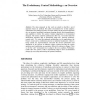Free Online Productivity Tools
i2Speak
i2Symbol
i2OCR
iTex2Img
iWeb2Print
iWeb2Shot
i2Type
iPdf2Split
iPdf2Merge
i2Bopomofo
i2Arabic
i2Style
i2Image
i2PDF
iLatex2Rtf
Sci2ools
112
click to vote
AE
2003
Springer
2003
Springer
The Evolutionary Control Methodology: An Overview
The ideas proposed in this work are aimed to describe a novel approach based on artificial life (alife) environments for on-line adaptive optimisation of dynamical systems. The basic features of the proposed approach are: no intensive modelling (continuous learning directly from measurements) and capability to follow the system evolution (adaptation to environmental changes). The essence could be synthesized in this way: "not control rules but autonomous structures able to dynamically adapt and generate optimisedcontrol rules". We tested the proposed methodology on two applications, the Chua’s circuit and a combustion process in industrial incinerators which is being carried out. Experimentation concerned the on-line optimisation and adaptation of the process in different regimes without knowing the system equations and considering one parameter affected by unknown changes. Then we let the ‘alife’ environment try to adapt to the new condition. Preliminary results show t...
AE 2003 | Artificial Intelligence | Dynamical Systems | Environmental Changes | On-line Adaptive Optimisation |
Related Content
| Added | 06 Jul 2010 |
| Updated | 06 Jul 2010 |
| Type | Conference |
| Year | 2003 |
| Where | AE |
| Authors | Mauro Annunziato, Ilaria Bertini, M. Lucchetti, Alessandro Pannicelli, Stefano Pizzuti |
Comments (0)

